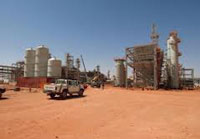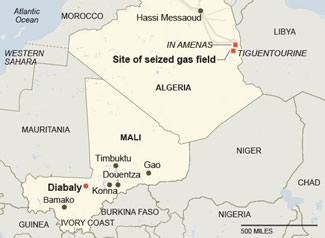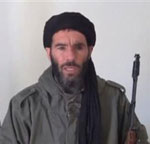redo Jump to...
print Print...
 (by Lamine Chikhi, Reuters) – Twenty-five foreign hostages escaped and six were killed on Thursday when Algerian forces launched an operation to free them at a remote desert gas plant, Algerian sources said, as one of the biggest international hostage crises in decades unfolded.
(by Lamine Chikhi, Reuters) – Twenty-five foreign hostages escaped and six were killed on Thursday when Algerian forces launched an operation to free them at a remote desert gas plant, Algerian sources said, as one of the biggest international hostage crises in decades unfolded.
Three other hostages were later freed by the army, a local source told Reuters, as the military operation continued after dark. The reported loss of hostages’ lives in the fast-moving events raised a chorus of concern from Western leaders.
The standoff began when gunmen calling themselves the Battalion of Blood stormed the gas facility on Wednesday morning. They said they were holding 41 foreigners and demanded a halt to a French military operation against fellow al Qaeda-linked Islamist militants in neighboring Mali.

The raid increased fears that jihadist militants could launch further attacks in Algeria, a vast desert country with large oil and gas reserves that is only just recovering from a protracted conflict with Islamist rebels during the 1990s which cost an estimated 200,000 lives.
A local source told Reuters six foreign hostages were killed along with eight captors when the Algerian military fired on a vehicle being used by the gunmen.
He said 40 Algerians and three foreigners were freed by the army as it continued its operation into Thursday evening. An Algerian security source said earlier 25 foreign hostages had escaped.
Mauritania’s ANI news agency, which has been in constant contact with the kidnappers, had earlier said seven hostages were still being held: two Americans, three Belgians, one Japanese and one British citizen.
It quoted one of the kidnappers as saying that Algerian ground forces were trying to fight their way into the complex.
The reports were difficult to confirm. Algeria’s official APS news agency said about half the foreign hostages had been freed and about 600 Algerian workers at the site had fled.
ANI and Qatar-based Al Jazeera [News] reported that 34 of the captives and 15 of their captors had been killed when government forces fired from helicopters at a vehicle. Those death tolls, far higher than confirmed by the local source, would contradict the reports that large numbers of foreigners escaped alive.
On Thursday evening, ANI said it had lost all contact with the kidnappers.
Britain and Norway, whose oil firms BP and Statoil run the plant jointly with the Algerian state oil company, said they had been informed by the Algerian authorities that a military operation was under way.
British Prime Minister David Cameron called his Algerian counterpart to express his concern at what he called a “very grave and serious” situation, Cameron’s spokesman said.
“The Algerians are aware that we would have preferred to have been consulted in advance,” the spokesman said.
RAISING THE STAKES
The incident dramatically raises the stakes in the French military campaign in neighboring Mali, where hundreds of French paratroopers and marines are launching a ground offensive against rebels after air strikes began last week.
“What’s happening in Algeria provides further evidence that my decision to intervene in Mali was justified,” French President Francois Hollande said, adding that things seemed to have taken a “dramatic” turn and he was still seeking details.
He said earlier that an unspecified number of French nationals were among the hostages.
Algerian Interior Minister Daho Ould Kablia said the kidnappers were led by Mokhtar Belmokhtar, a veteran Islamist guerrilla who fought Soviet forces in Afghanistan in the 1980s and had set up his own group in the Sahara after falling out with other local al Qaeda leaders.
A holy warrior-cum-smuggler dubbed “The Uncatchable” by French intelligence and “Mister Marlboro” by some locals for his illicit cigarette-running business, Belmokhtar’s links to those who seized towns across northern Mali last year are unclear.
The hostage takers earlier allowed some prisoners to speak to the media, apparently to put pressure on Algerian forces not to storm the compound. An unidentified hostage who spoke to France 24 television said prisoners were forced to wear explosive belts and captors had threatened to blow up the plant.
A local source told Reuters the hostage takers had blown up a petrol filling station at the plant.
Two hostages, identified as British and Irish, spoke to Al Jazeera television and called on the Algerian army to withdraw from the area to avoid casualties.
“We are receiving care and good treatment from the kidnappers. The (Algerian) army did not withdraw and they are firing at the camp,” the British man said. “There are around 150 Algerian hostages. We say to everybody that negotiations is a sign of strength and will spare many any loss of life.”
Ireland said later that the Irish hostage was among those freed.
NUMBERS UNCONFIRMED
The precise number and nationalities of foreign hostages could not be confirmed, with some countries reluctant to release information that could be useful to the captors.
Britain said one of its citizens was killed in the initial storming on Wednesday and “a number” of others were held [captive].
The militants said seven Americans were among their hostages. The White House said it believed Americans were among those held but U.S. officials could not confirm the number. “This is an ongoing situation and we are seeking clarity,” White House spokesman Jay Carney told reporters, expressing concern about the reported loss of lives.
Norwegian oil company Statoil said nine of its Norwegian staff and three Algerian employees were captive. Britain’s BP, which operates the plant with Statoil and Algerian state oil company Sonatrach, said some of its staff were held but would not say how many or their nationalities.
Japanese media said five workers from Japanese engineering firm JGC Corp. were held, a number the company did not confirm. Vienna said one hostage was Austrian, Dublin said one was Irish and Bucharest said an unspecified number were Romanian.
Spanish oil company Cepsa said it had begun to evacuate personnel from elsewhere in Algeria, an OPEC member, and BP said it was planning to evacuate some non-essential staff.
[President] Hollande has received public backing from Western and African allies who fear that al Qaeda, flush with men and arms from the defeated forces of Libya’s Muammar Gaddafi, is building a desert haven in Mali, a poor country helpless to combat fighters who seized its north last year. …The militants, communicating through established contacts with media in neighboring Mauritania, said they had dozens of men armed with mortars and anti-aircraft missiles in the compound and had rigged it with explosives.
“We hold the Algerian government and the French government and the countries of the hostages fully responsible if our demands are not met, and it is up to them to stop the brutal aggression against our people in Mali,” read one statement carried by Mauritanian media.
They condemned Algeria’s secularist government for letting French warplanes fly over its territory to Mali and shutting its border to Malian refugees.
PRESSING ON
The attack in Algeria did not stop France from pressing on with its campaign in Mali. It said on Thursday it now had 1,400 troops on the ground in Mali, and combat was underway against the rebels that it first began targeting from the air last week. …
(Reporting by Lamine Chikhi; Writing by Peter Graff; Editing by Giles Elgood and Philippa Fletcher)
Reprinted here for educational purposes only. May not be reproduced on other websites without permission from Thomson Reuters. Visit the website at Reuters.com.
Questions
1. Who attacked a gasoline plant in Algeria?
2. a) Why did they say they did it?
b) Why do Western officials contradict this explanation? (see “Background” below the questions)
3. An unknown number of foreign workers have been killed or taken hostage. What countries are these men from?
4. What do you learn from the article about the leader of the terrorists?
5. a) Why do you think the Algerian government did not consult U.S., British and other foreign leaders before sending the military in in a rescue operation?
b) More news reports are indicating that Western governments say the Algerians should have consulted with them before launching their operation. Do you think Algeria should have consulted with President Obama and our military before attempting a rescue operation? (Would it have saved the lives of those taken captive?) Explain your answer.
Read about the French military operation against al Qaeda in Mali at: studentnewsdaily.com/daily-news-article/mali-islamists-counter-attack-promise-france-long-war.
Background
“We’ll kill infidels:” Algeria gunmen told hostage (reuters.com):
- In a rare eyewitness account of Wednesday’s raid, a local man employed at the facility told Reuters the militants appeared to have good inside knowledge of the layout of the complex and used the language of radical Islam.
- “The terrorists told us at the very start that they would not hurt Muslims but were only interested in the Christians and infidels,” Abdelkader, 53, said by telephone from his home in the nearby town of In Amenas. “We will kill them, they said.”
- …Abdelkader described how he managed to escape along with many of the hundreds of Algerians initially detained.
- “I am still choked, and stressed,” he said, adding that he feared many of his foreign colleagues may have died. “The terrorists seemed to know the base very well,” he said, “Moving around, showing that they knew where they were going.”
Officials say Algeria attack planned before French strike in Mali (from another reuters article):
- European and U.S. national security officials said on Thursday that Algerian militants planned their hostage-taking attack on a remote desert gas plant well before a French military operation against militants in neighboring Mali.
- Intelligence indicates that the hostage takers, believed to be members of a breakaway faction of al Qaeda’s North African affiliate, Al Qaeda in the Islamic Maghreb (AQIM), had planned to capture the hostages and take them to a hideout where it would be harder to mount a rescue attempt, a European security official said.
- Representatives of the hostage takers told a news service in nearby Mauritania that the attack was a response to the French military operation to clear out Islamic fighters who have taken control of a large swath of territory in northern Mali. The French operation began on Friday, January 11.
- However, U.S. and Western security sources said they believed it was more likely that the motivation behind the hostage-taking was to obtain a ransom, most likely in cash, but also possibly to seek a release of militant prisoners.
- The standoff began when gunmen stormed the gas facility on Wednesday. They said they were holding 41 foreigners and demanded a halt to the French military operation in Mali.
- Several Western security sources said that although details about the hostage-taking remain murky, available evidence suggests the attack was too sophisticated to have been organized in the wake of the French operation in Mali, although the decision to launch it now may have been influenced by events in Mali.
- The sources said it was more likely the hostage-takers had seized on news of that operation as a pretext for their attack.
- Bruce Riedel, a former CIA analyst who has advised President Barack Obama on counterterrorism policy, said the hostage-taking could fuel criticism that U.S. authorities should have been paying closer attention to the threat posed by Islamic militants in north Africa.
- Some of Obama’s political opponents for months have been raising similar questions about the U.S. security and intelligence posture in Benghazi, Libya, where militants launched a deadly attack on two U.S. official installations last September 11.
- U.S. and European sources said the reported leader of the Algerian militant faction that took workers from BP and Statoil hostage, Mokhtar Belmokhtar, is a former leading member of AQIM. He either split from, or was thrown out of, the al Qaeda affiliate because he was regarded as too difficult to work with and too interested in self-promotion, they said.
Daily “Answers” emails are provided for Daily News Articles, Tuesday’s World Events and Friday’s News Quiz.




